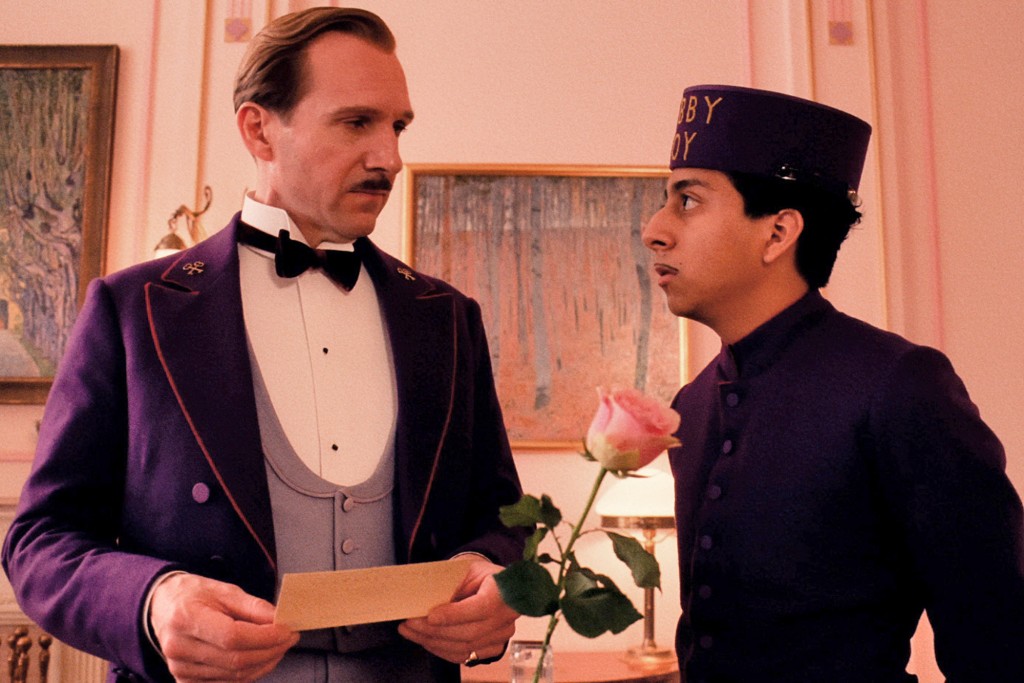
You could watch a Wes Anderson film on mute and without credits and still recognize it as one of his own: the way the camera glides on rigid axes, the arrestingly symmetrical compositions, the vibrant colour schemes. The style is so deeply interwoven with the substance that to try to parse the two apart would be a fool’s errand. WithThe Grand Budapest Hotel, Anderson’s formal quirks have reached peak levels of expressionistic bliss, as if he built a film out of the contents of a cabinet of curiosities from a fanciful, parallel-dimension Eastern European country circa World War II. It’s also the latest in a run of masterpieces dating back five years that showcase the director’s newfound, entirely-welcome sense of play.
The film’s main framing device is a marvel of giddy structural excess. The story is narrated in the third person past by the younger version of its author, as read by a nameless girl at said author’s gravestone. What’s more, each of these stories oscillates between different aspect ratios. The Russian nesting doll structure of the film is just one of many formal filigrees the film is built from. The tale of legendary hotel concierge Gustave H. (Ralph Fiennes) and his protégé Zero Moustafa (Tony Revolori as a boy, F. Murray Abraham as a old man) is constructed not so much as a novel as it is a scrapbook. Bits of detritus constantly show up to add texture to the scenes: a letter here, a map there, some title cards spread throughout. The film borrows visual cues from seemingly everywhere, from silent-movie irises to shadow-play tableaux and good old-fashioned rear projection. This all adds up to an incredibly transfixing form of twee maximalism that gets more polished and more exhilarating as Anderson’s career progresses.
Wes Anderson’s cinema is palimpsestic; each successive film carries the evidence of those that came before it. For example, this can take the form of visual echoes from previous movies. The most recent occurrence of this in Anderson’s filmography is his use of animation; every film he’s made since 2009’s stop-motion jam Fantastic Mr. Fox has had animated sequences in some capacity. Also, the same actors keep showing up in his movies, tying them all together if only by their presence. There’s also his recurring Cartesian camera work and his colourful, immaculately cluttered mise-en-scène. The end result of this is a cohesiveness of vision that is unparalleled in contemporary American film, coupled with a consistent sense of refinery. One gets the impression that with each successive movie he makes, Anderson keeps adjusting what a Wes Anderson movie consists of. This is a good thing as it lends vitality to a director who too often gets shortchanged as a sad-white-folks dramatist. Case in point: this movie is frequently gut-bustingly hilarious. And unexpectedly violent.
Anderson’s secret weapon has always been his sense of humour. His scripts are usually deadpan and dryly funny, which makes the film’s more vulgar, ribald moments all the more satisfying. Much of the credit for this goes to Fiennes, who weds his snooty continental affect to liberal doses of gloriously-phrased profanity. It’s also his most graphic film, featuring moments that are shocking in their brutality, most of them involving hired goon Willem Dafoe. These moments too are darkly comic in their own way, but they reinforce the feeling that Anderson is thrillingly going for broke with this picture. In his own way, the director seems to be curbing expectations towards what his movies can consist of.
The Grand Budapest Hotel is the director’s first foray into period territory (even though, as stated before, this is a heavily fictionalized vision of said period), and marks the first time he’s made a live-action caper film since his still-underrated 1996 debut Bottle Rocket. But this is still a Wes Anderson movie, and as such, family plays a key part in the narrative. Progressively, Anserson’s movies have shifted away from the dynamics of dysfunctional families to those of artificial ones, where people of different backgrounds come together to create a better personal space for each other. Both Gustave and Zero have no family to speak of, and most of the film is anchored by their bonding during their great trans-European adventure.
That said, it’s unsurprising that this is Anderson’s busiest script to date, weaving in Agatha Christie levels of backstabbing, plotting, and murder to what is essentially a story about a man and his hotel. But given the story’s triple-decker structure, the man in question changes. The core story is about Gustave H.’s pride and joy and the forces conspiring to take it away. One layer removed, it becomes Moustafa’s story, one of melancholy and nostalgia for a bygone time. Go up one final level, and it’s about a man trying to imagine a past he wasn’t a part of using only a relic as a jumping-off point, not unlike Anderson himself.This mutability of perspective isThe Grand Budapest Hotel‘s quiet genius. The loud genius here is how Anderson wields his penchant for formal opulence to magnificent ends.
–
Directed by Wes Anderson; written by Wes Anderson & Hugo Guinness; inspired by the works of Stefan Zweig; starring Ralph Fiennes, Tony Revolori, F. Murray Abraham, Saoirse Ronan, Mathieu Amalric, Adrien Brody, Willem Dafoe, Jeff Goldblum, Harvey Keitel, Jude Law, Bill Murray, Edward Norton, Jason Schwartzman, Tilda Swinton, Léa Seydoux, Tom Wilkinson, and Owen Wilson; 100 minutes.
The Grand Budapest Hotel is now available
- For rental and purchase on Amazon Instant
- On Blu-ray and DVD



 Derek
Derek
 Isabelle
Isabelle